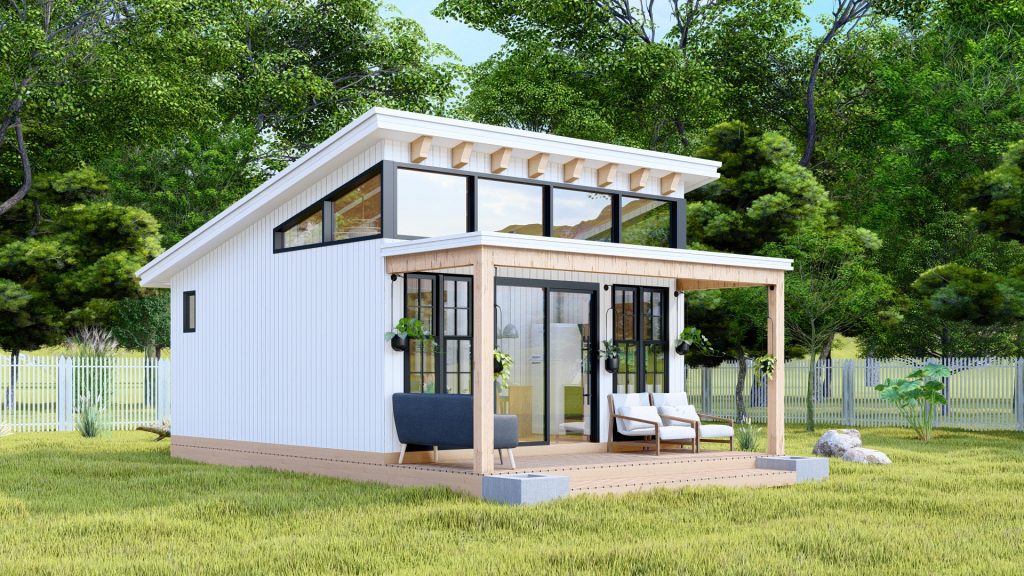The tiny home movement started in the seventies but rocketed to mass popularity in the 2010s. Popular television shows like Tiny House Hunters and the rise of influencers showing off their #vanlife adventures combined with the economic realities of homeownership have made small-space living seem like a silver bullet. After all — you can have a chic design for 1/10th of the price.
But what most people don’t realize is that the tiny homes they see are actually ADUs — accessory dwelling units. Here’s how to differentiate between the two and decide about what’s best for your situation.
What is an ADU?
An ADU is an accessory dwelling unit, which means it’s a permanent structure built on your property. The term “dwelling” refers to housing, meaning the intention of an ADU is to provide a secondary housing option on your existing lot. However, ADUs are versatile and can be used as pool houses, studios, offices, or more. The biggest distinction is that they are permanent fixtures, whether they are attached, detached, or even internal to the main single-family home.
States and municipalities often have regulations for ADUs. In Atlanta, ADUs can be no higher than 20 feet and no larger than 750 square feet. They also must contain a kitchen to be considered a dwelling.
What is a Tiny Home?

A tiny home on the other hand, refers to a single-family home, generally 400 square feet or less. It’s also categorized as a dwelling, which means it must have permanent provisions for sleeping, cooking, and personal hygiene.
However, the term tiny home is broad — it can refer to a stick-built or modular dwelling with a permanent location, a mobile home, or even an RV. The same building codes that apply to a dwelling structure won’t necessarily apply to a tiny home in the form of a retrofitted custom van. However, if it’s being used as a dwelling, zoning requirements will apply.
How ADUs and Tiny Homes are Different
Mobility
This one is simple. ADUs are always permanent and built on a load-bearing foundation, whether the construction is stick-built or prefab. Tiny homes can refer to a permanent structure, but also include homes that move.
Property Requirements
Both tiny homes and ADUs require enough space to build. This means flat, treeless space that doesn’t encroach on setbacks or height ordinances. Just because you have 350 square feet of land doesn’t mean you can put a 350-square-foot structure on it!
ADUs typically need to be less than a certain percentage of the total lot space when the main dwelling square footage is taken into account. In Atlanta zones that allow tiny homes, that is between 50-55%.
Since tiny homes typically must abide by single-family housing requirements, in Atlanta, the minimum lot size is 2,800 square feet for a traditional single-family home.
ADU Zoning and Permits
This is where it gets tricky. Tiny home zoning and permits depend heavily on your location and your property.
ADUs must be on a lot that contains a main dwelling, and abide by zoning laws and setbacks. Not every city or county allows a secondary residence, but much of the City of Atlanta does!
Tiny homes are the main dwelling and they must comply with the same zoning laws, building codes and all other regulations that would apply to a single-family home.
Depending on the municipality, both tiny homes and ADUs will be subject to regulations like height, setbacks, and square footage. In addition, rules on zoning for ADUs vary from locality to locality.
However, since ADUs are a secondary dwelling, you typically need to provide proof of ownership for the lot and detailed site and construction plans to obtain an ADU permit. A tiny home permit however, can be more involved since it’s the only residence — if you are constructing a permanent tiny home. Tiny homes on wheels must abide by a different set of codes! In much of Georgia, adding permanent tiny homes follows the same process for permitting as a regular home. You may need to plan for foundation installation, utility hookups, site grading, and more. Plus, you must have proof of these plans to gain a permit to build.
Which Is Better?
It depends on your personal requirements and preferences! If you are looking for an affordable substitute for a traditional single-family home, a tiny house likely makes more sense for you.
However, if you are looking for additional space on your existing property — whether it’s a guest house, a long-term or vacation rental, or a space for loved ones to age in space, an ADU probably fits the bill.
Here are some questions you should consider:
Does an ADU cost more than a tiny home?
All said and done, the structures themselves are a similar cost. However, since an ADU assumes that you own property already, the cost is lower because it doesn’t include the acquisition of land.
How big can an ADU be? What about a tiny home?
An ADU in Atlanta can be up to 750 square feet and 20 feet tall. In surrounding counties, that limit changes slightly — other counties allow up to 1,000 square feet.
Tiny homes are generally considered to be less than 400 square feet. However, since they are single family homes, there aren’t any hard and fast rules for their size, with the exception of some localities that have minimum square footage requirements for new home construction. Building codes also require minimum square footage for sleeping and fire safety, so be sure to know those in your area!
What is the difference in rental & resale value?
It depends on your market! In Georgia, ADUs cannot be subdivided and sold separately from the main dwelling. However, an ADU on your property adds finished living space and therefore increases your home’s resale value.
However, renting an ADU and tiny home of the same size may generate slightly different rates. Factors like privacy, location, and size all come into account. Tiny homes have the benefit of being on their own property, while ADUs offer lower operating costs!
Ready to Build?
Get the most value from your ADU by working with an expert ADU builder. Georgia ADU is a family-owned business serving Atlanta and surrounding cities.
We always start with a free consultation and feasibility study to enable you to make the right choice for your property. Learn more about your local zoning laws and find out if your property is suitable by getting in touch.
